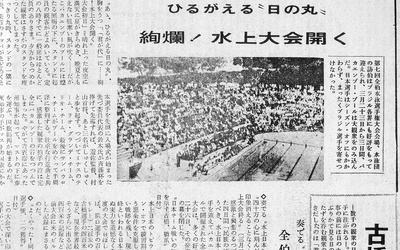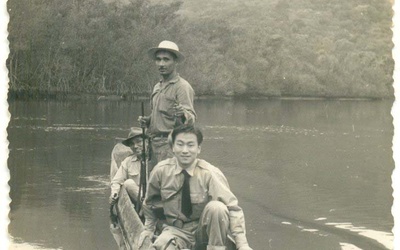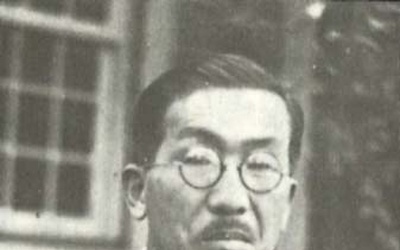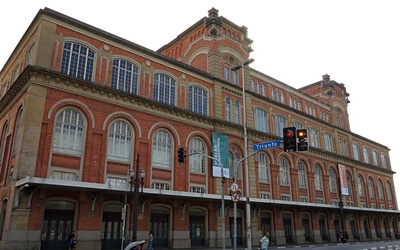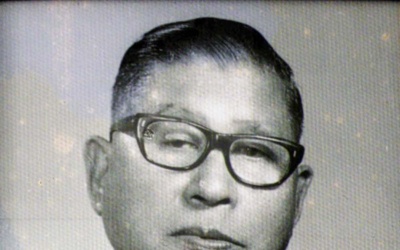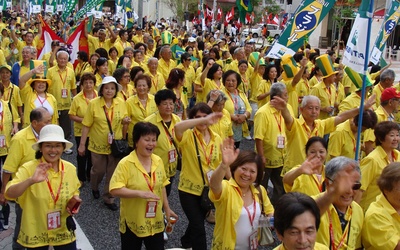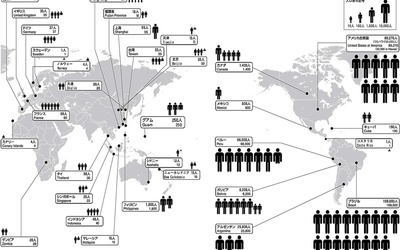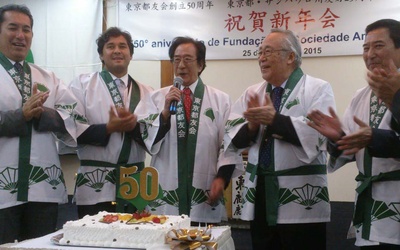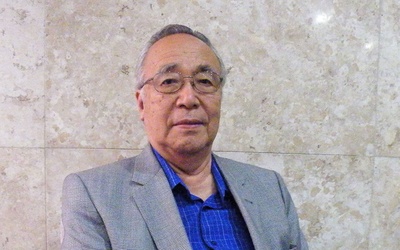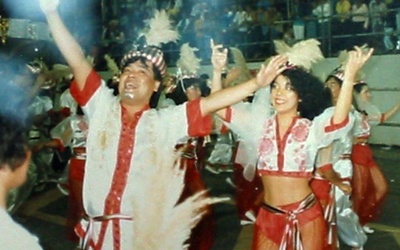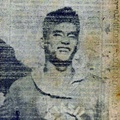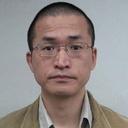
Masayuki Fukasawa
@masayukifukasawaBorn on November 22, 1965, in Numazu City, Shizuoka Prefecture, Japan. In 1992, he went to Brazil for the first time and worked as an intern at Paulista Shimbun (Japanese newspaper in Brazil). In 1995, he went back to Japan and worked with Brazilians at a factory in Oizumi-machi, Gunma Prefecture. He wrote a book, Parallel World (Ushio Publishing) about his experiences there and received Ushio Nonfiction Award in 1999. He returned to Brazil in 1999. Beginning in 2001, he worked at Nikkey Shimbun and became the editor-in-chief in 2004. He has been an editor-in-chief of Diário Brasil Nippou since 2022.
Updated January 2022
Stories from This Author
Tetsuo Okamoto Swam to Show His “Japanese Spirit”—He Was One of Three Athletes of Japanese Ethnicity Representing Three Countries That Dominated the Podium of the 1,500-meter Freestyle Swimming at the Helsinki Olympic Games
June 14, 2016 • Masayuki Fukasawa
Just two months away from the Rio Olympic Games, let us take a moment here. Do you know that once in the history of the Olympic Games, one podium was dominated by three athletes, all from different countries but of the same Japanese ethnicity? In the 1952 Helsinki Olympic Games, the podium for the 1,500-meter freestyle in swimming was taken by Ford Konno, a Japanese American from Hawaii who took first place, Shiro Hashizume from Japan who took second place, …
The genealogy of "left-wing intellectuals": A unique group of Brazilian immigrants who lived romantic lives - Part 2
Jan. 29, 2016 • Masayuki Fukasawa
Read Part 1 >> Kenji Yamazaki, who gave up his position as a member of parliament and sacrificed himself for love and the romance of pioneering in South America A representative example of postwar left-wing immigrants is Yamazaki Kenji (1902-1958, Gotemba City, Shizuoka Prefecture). He was elected to the Numazu City Council in 1931, became a permanent executive committee member of the Social Mass Party the following year, and was elected to the Shizuoka Prefectural Assembly in 1935, building up …
The genealogy of "left-wing intellectuals": A unique group of Brazilian immigrants who lived romantic lives - Part 1
Jan. 28, 2016 • Masayuki Fukasawa
Although they are simply referred to as "Japanese immigrants in Brazil," each person has their own unique motivation for moving to the other side of the world. Of course, generally speaking, most of them came from a place of "seeking a better life," but in reality, they were motivated by poverty, new opportunities, and starting over, and many of them had conservative ideologies. However, there was also a small group of "left-wing intellectuals seeking political asylum." This time, I would …
"Isolated on the Battlefield of South America" The only Japanese book banned in Brazil - The indomitable journalist, Koichi Kishimoto, Part 2
Oct. 16, 2015 • Masayuki Fukasawa
Read Part 1 >> What is "dangerous content"? So what kind of "dangerous content" about wartime was written in "Senya"? The overall tone of the book is lyrical and highly praiseful of Japan, giving it the victorious atmosphere. The headings of Chapter 1, Section 1 of "Senya" are "The Severance of Diplomatic Relations between Japan and Brazil," "The Struggles Under Funding Freeze," "The Difficulties of Japanese Language Education," "50 Japanese Farm Families Ordered to Leave," and "Japanese in the City …
"Isolated on the Battlefield of South America" The only Japanese book banned in Brazil - The indomitable journalist, Koichi Kishimoto, Part 1
Oct. 15, 2015 • Masayuki Fukasawa
At 10 a.m. on March 3, 1948, a detective from the Social and Political Police (DOPS, equivalent to the Special Higher Police in Japan) suddenly showed up at the boarding school Gyosei Gakuen in the Pinheiros district of São Paulo and ordered the school's principal, Koichi Kishimoto (pen name Oka Yo, 1898-1977), who had just published his Japanese book, Isolated in the South American War (hereafter abbreviated as War), to appear before them. He was incarcerated for about a month …
Immigration—Missing Link in Japanese History: Why Are There So Many Okinawan Immigrants? – Part 2
Aug. 19, 2015 • Masayuki Fukasawa
Read Part 1 >> Bringing Their Culture in Mass Immigration “You can see the Okinawa of the Meiji era in Brazil”—local papers in Okinawa often use this line. This is because people brought their customs and language to Brazil in mass immigration. Even to this day, Uchinaaguchi (the Okinawan language) is used at home among many families. In Okinawan-hosted events, you would see “Uchinaaguchi plays,” and the “Uchinaaguchi speech contest” is held every year. Also, in the Okinawan forum which …
Immigration—Missing Link in Japanese History: Why Are There So Many Okinawan Immigrants? – Part 1
Aug. 18, 2015 • Masayuki Fukasawa
In Japan, Okinawans have been in conflict with their government over the US base relocation. The word “immigration” may be one of the key words to understanding their unique way of thinking. In Japanese history, there is a missing link—the history of immigration—and perhaps the great majority of people are not even aware of the fact that it is missing from their history. For the Japanese living in Japan, things that happen at the sites of immigration are out of …
Toshihiko Tarama, the man known as the "Showa era's descendant of the heavenly grandson" - A tale of a nobleman's wanderings on the other side of the world - Part 2
May 20, 2015 • Masayuki Fukasawa
Read Part 1 >> The fake palace fraud incident also occurred right after the end of the war When asked about his motivation for moving during an interview (January 10, 2013) in a hotel lobby in São Paulo, he replied, "I heard that Tarama had no successor. I had a lot of connections with Americans, but I thought it would be easier to live in South America than a Protestant country, so I had been wanting to go there for …
Toshihiko Tarama, the man known as the "Showa era's descendant of the heavenly grandson" - A tale of a nobleman's wanderings on the other side of the world - Part 1
May 19, 2015 • Masayuki Fukasawa
While studying the history of performing arts and Japanese literature, folklorist Orikuchi Shinobu proposed the concept of "tales of the wandering nobleman" as the prototype of narrative literature in Japan. The story is about someone of high status, such as royalty or aristocrat, being abandoned for some reason and forced to leave their home, being placed in unfortunate circumstances or on the lower world, where they go on journeys and adventures to demonstrate their righteousness or some kind of power. …
Carnival and Japanese Immigrants: Foreign Culture in Brazilian Folklore, Part 2
Feb. 6, 2015 • Masayuki Fukasawa
Read Part 1 >> The first time Japanese immigration is the topic Japanese immigrants, who had kept their distance from Carnival, were first chosen as the theme of the parade in 1983 by the Escola "Barroca Zona Sul" in the city of São Paulo. At the time, they were the top-ranking special group, and paraded to the theme song "75 Years of Immigration or the Land of the Rising Sun," placing sixth out of ten teams. At that time, they …

